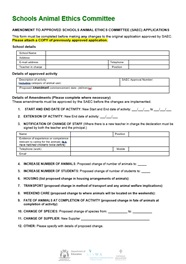
Resources
Animal Ethics System
Topic: Animal ethics
On this page
Use of animals in schools
Teachers planning to use animals for a teaching activity under the science strand may be required to submit an application and obtain approval from the Schools Animal Ethics Committee (SAEC) prior to commencing the activity. Obtaining approval is a requirement of the Western Australian Animal Welfare Act 2002.
Teachers should familiarise themselves with the Australian code for the care and use of animals for scientific purposes - 8th edition, Section 4: The care and use of animals for the achievement of educational outcomes in science. Applications can only be considered at SAEC meetings held the Tuesday of Week 3 and Week 8 of each school term. There are cut-off dates for each meeting.
Animal Ethics System
The Animal Ethics System is a web-based, software application. It is designed to reduce the time and effort required for schools to create and lodge applications and submit reports to the Schools Animal Ethics Committee (SAEC) for scientific activities. Both the system and the user manual are designed to support schools and provide guidance about the requirements of the SAEC as the teacher and principal progress through the application and reporting processes.
Principals and teachers from all Department of Education schools have automatic access to the system. Staff from Catholic schools and AISWA member schools (non-government independent schools) must contact their SAEC executive officer for a user ID and password before being able to log in and use the system.
If you want to alter any part of an approved activity, you must complete an Amendment to approved SAEC applications form. This form must be approved by the SAEC before you commence the activity.
User manuals
There are small variations in the processes between Department of Education schools and other schools. Download the manual relevant to your school. Some sections of the manuals apply only to the person applying to use animals and some sections only apply to principals.
If you are a teacher, education assistant or head of department applying to use animals, pay special attention to the following sections in your sector's manual:
- Completing an application (sections 1 to 8)
- Submitting an amendment to an approved application (section 9)
- Completing an Activity completion report (section 10)
- Adding the next year’s activity to a 3-year approval (section 11).
If you are a principal, you need to:
- read your responsibilities (section 12)
- review your staff’s activity and submit it to the SAEC (section 13)
- submit an annual report (section 15).
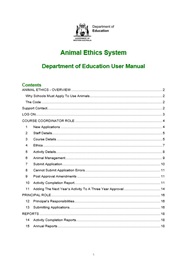
Department of Education - Animal Ethics System user manual
The Animal Ethics System is a web-based, software application designed to reduce the time and effort required for schools to create and lodge applications and submit reports to the Schools Animal Ethics Committee (SAEC) for scientific activities.
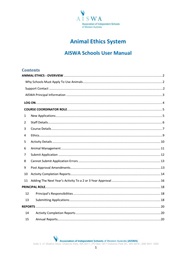
AISWA member schools - Animal Ethics System user manual
The Animal Ethics System is a web-based, software application designed to reduce the time and effort required for schools to create and lodge applications and submit reports to the Schools Animal Ethics Committee (SAEC) for scientific activities.
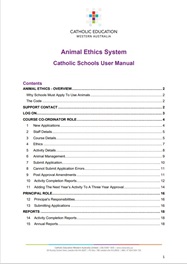
Catholic schools - Animal Ethics System user manual
The Animal Ethics System is a web-based, software application designed to reduce the time and effort required for schools to create and lodge applications and submit reports to the Schools Animal Ethics Committee (SAEC) for scientific activities.
Reporting requirements
If there is an illness, injury, death or unexpected incident (for example, an animal is lost), forward the Unexpected adverse event report to the Schools Animal Ethics Committee (SAEC) as soon as possible along with your animal use and health records for the period immediately before the incident.
For more detailed information on why these forms and processes are required refer to the Australian code for the care and use of animals for scientific purposes - 8th edition, Chapter 2.4: Responsibilities of investigators.
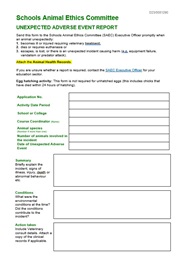
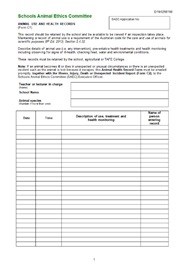
Animal use and health records
This record, for non-egg hatching activities, should be retained by the school and be available to be viewed if an inspection takes place.
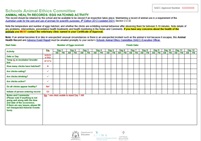
Egg hatching animal health records
This record, for egg hatching activities only, should be retained by the school and be available to be viewed if an inspection takes place.
